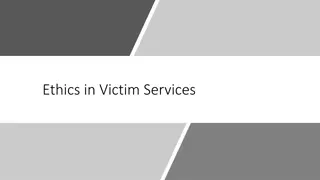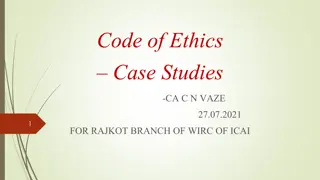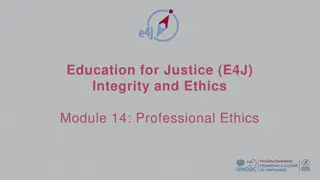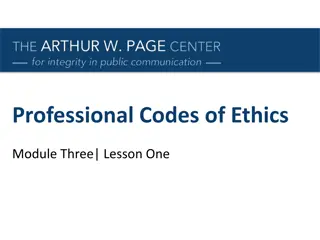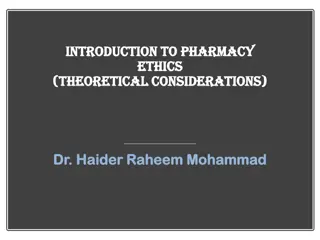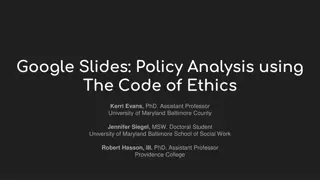Understanding the Code of Ethics in Professional Practice
Ethics play a crucial role in leadership and professionalism. This content discusses the definition of ethics, the difference between morals and ethics, and the importance of adhering to the Academy's Code of Ethics for Dietetic Practitioners. It highlights the expectations, duties to the public, and duties to clients, emphasizing honesty, integrity, and respect in professional conduct.
Download Presentation

Please find below an Image/Link to download the presentation.
The content on the website is provided AS IS for your information and personal use only. It may not be sold, licensed, or shared on other websites without obtaining consent from the author. Download presentation by click this link. If you encounter any issues during the download, it is possible that the publisher has removed the file from their server.
E N D
Presentation Transcript
Code of Ethics 2018 Hanna Kelley, RDN, CD Kate Capen, RDN, LD, CD
The Expectation The heart of the unwritten code of the ethics of leadership is the expectation that leaders will act in the best interest of those they serve and their followers.
Definition of Ethics Ethics are standards of behavior you should to live by Integrity is how consistent you are following your ethical standards Ethics are influenced by: Your values, your understanding of the roles you play; and your understanding of the obligations and dilemmas of those roles Integrity is influenced by your skills, knowledge and your character
Morals is not the Same as Ethics* MORALS are beliefs related to moral issues such as drinking, sex, gambling MORALS are influenced by religion, culture, family and friends ETHICS transcends cultural, religious and ethnic differences LAW = Something can be legal and not ethical
Academys Code of Ethics Dietetic Practitioners must conduct themselves with honesty, integrity and fairness Dietetic Practitioners support and promote high standards of professional practice Dietetic Practitioners are responsible to: The public Your clients The profession Your colleagues and other professionals RDN s must complete a minimum of 1 hour CPE in ethics during each 5 year recertification cycle (learning need code 1050)
Duties to the PUBLIC Considers health, safety and welfare of public at all times Complies with all laws and regulations No false or misleading practices or communications Must withdraw when unable to fulfill his professional duties to clients and others These duties/responsibilities are inclusive for all areas of practice
Duties to CLIENTS Recognizes and exercises professional judgment within limits of his qualifications; makes referrals if necessary Treats clients and patients with respect and consideration Protects confidential information and makes full disclosure of any limitations Comply with all public principles
Duties to our PROFESSION Practices with evidence based principles and current information Presents reliable information without personal bias, recognizing legitimate differences of opinion exists Lifelong duty to remain competent in practice Avoids conflicts of interest or discloses as needed Permits use of name with products/services only if rendered by him or supervised by him Accurately represents credentials & qualifications Does not invite, accept or offer gifts, monetary incentives or other considerations
Duties to COLLEGUES AND OTHER PROFESSIONALS Demonstrates respect for values, rights, knowledge and skills of colleagues and other professionals Website: hppt://www.eatright.org/codeofethics Handout Code of Ethics
How to evaluate an issue? Who does it involve? What kind of an issue is it? Ethical Legal Employer/Organization Policy Personal Issue Business Dispute Remember it can be a combination of one or more issues
Select the principle(s) that apply to the Code of Ethics 1. Competence and professional development in practice (Non-maleficence) 2. Integrity in personal and organizational behaviors and practices (Autonomy) 3. Professionalism (Beneficence) 4. Social responsibility for local, regional, national, global nutrition and well-being (Justice)
Example Scenario An RDN colleague voices his opinion about organic versus conventional food on several occasions. During an outpatient counseling session, you overhear this colleague strongly encouraging a client to use only organic foods, over the client s protest that organic produce is either unavailable or extremely expensive in her nearby grocery store. As the conversation evolves, the RDN suggests that the client purchase small amounts of produce so that the family budget will allow purchase of organic varieties.
Example Scenario There are two individuals working at the same hospital. They were married before starting at this hospital but are now divorced. They work in different departments, since one is a pharmacist, the other an RDN. The RDN becomes VP, and the pharmacy is restructured to be under the VP. There are two levels of supervision between VP and pharmacist, initially, but the Pharmacist is promoted to be within one level of partner who is the VP. Another individual who was up for the same promotion accuses organization of nepotism.
Table Scenarios Ethical issues are rarely black and white . Is this described as an ethical issue? (Or something else?) If so, what principles of the code of ethics does it relate to and why? 5 minutes to discuss
Example Scenario An employer is reviewing applications for an open RDN position. Is it legal or ethical to look at an applicant s public Social media accounts and use information they find there in making a decision? Once an employee is hired, should the employer continue to monitor staff s public social media?
Example Scenario Your patient has suffered a devastating stroke. The physician has offered the option of hospice care. Patient has dysphagia and is unable to communicate his wants, and their Living Will states he did not want a feeding tube. Patient s has designated his two children his Healthcare POA. They disagree on if a feeding tube should be placed or hospice services should be started. What is the role of the RDN in assisting the family s choice?
Example Scenario The client had gastric bypass but also has underlying diabetes. The MD listed diagnoses in order of what they are treating primarily, and so the RD goes back to the MD and asks him/her to reorder or add to the diagnoses list to be able to get the client to get reimbursed for other conditions. The client has Medicare and goes back to GI MD to ask them to include other conditions on referral to increase reimbursements and up codes the number of units that is spent on the client.
Example Scenario A RDN s Certification credential has lapsed, and he/she does not discover it for 1 week post-deadline. This RDN is a private practice consulting dietitian in a non- licensure state, with no boss or HR department checking that they are up-to-date. The RDN has 3 patients scheduled this week.
Example Scenario A position is offered to an RDN with 15 years experience, and the job description is within the AND scope for dietitians. However, this RDN does not have recent experience in this area of practice.
Tools to Evaluate Situations What do you NOT know? Are funds are needed? If so, where are the funds coming from and being allocated to? Do you have enough time to evaluate the decision? Do you have conflicts of interest? Do you have competing professional and personal values? Could your decision impact your job security? What are the relevant ethical facts? What additional information is needed? What are the specific ethical questions or value conflicts? How would you respond to them? What is the ethical basis for your thinking?
SUMMARY Ethical issues are rarely black and white Code of Ethics provide guiding principles organized by who we have responsibilities to: Public Client Profession Colleagues and Other professionals Situations with ethical considerations can span all practice settings and all areas of practice
Reading List Academy/CDR Code of Ethics www.eatright.org/codeofethics Academy of Nutrition and Dietetics Position Papers www.eatright.org/positions Academy of Nutrition and Dietetics Scope of Practice www.eatright.org/scope






